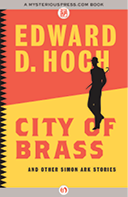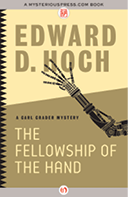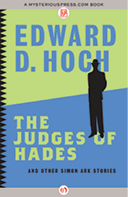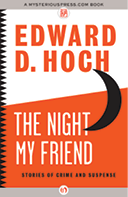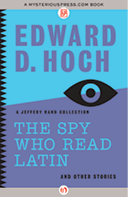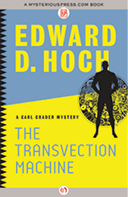The Shattered Raven (17 page)
Read The Shattered Raven Online
Authors: Edward D. Hoch

“But what did the killer do? He came later.
After
Susan and I had been there. What could possibly be the reason for this? I can think of only one—he did not learn about Irma Black until some time late that morning. Too late to get down there before the noon meeting. And who was the only person that learned about the telegram late Monday morning? You, Mr. Rowe.”
Victor’s hands were sweating now, but this was a long way from proof. Let them try to prove something. “I had this knowledge?” he asked.
“You had this knowledge—because Susan told me on countless occasions that she typed up rough drafts of what took place in our investigation and left them in your
In
box each morning. It was for the continuing article she was writing about the killing. What it amounted to was that each morning, on your desk, was a transcript of what had happened, what had gone before, what I’d been doing. No wonder you were so anxious for her to stick close to me and write this series! That morning, Monday morning, you read her report and learned about Irma Black.”
Susan interrupted here. “He was in a meeting, and I left it on his desk! He was still in the meeting when I went down to meet you. It would have been some time later, probably about noon, before he read it.”
“And then,” Barney continued, “he wasted no time—did you, Mr. Rowe? Mr. Rowe, Mr. Jones, Mr. Raven. You went down there and killed her, before she could do any more talking to anybody. The same holds true for our trip to Nebraska, of course. You knew all about it, right from the beginning. Susan even called to keep you abreast of developments. You knew just the time when you had to make the trip. You knew where to find us. You knew which car was ours, because Susan’s flowery attaché case was in the back seat. I hadn’t seen the attaché case before that day, and none of the others had seen it, either. Not at MWA. But you saw it every day in the office, didn’t you? And you found us right away, and broke into the right car, even though there was an identical blue Ford parked right next to ours. No one but you could have identified our car from Susan’s attaché case, Mr. Rowe.”
“I think you’ll need a lot more than that in court,” Victor Jones said, holding his hands steady now.
“I have more,” Barney said. “I was at the MWA office today, and I happened to see a book by Graham Greene, and I remembered Ross Craigthorn’s murder, and the exact circumstances of it. You see, the gimmicky murder device with the bullet, fired by a radio signal served more than one purpose. It tended to implicate a mystery writer by its very deviousness, but it did much more. It enabled the killer to wait in perfect safety until the last possible moment before firing that bullet, maybe with the faint hope that Craigthorn would change his mind and not reveal the secret after all. You must have stood there with your finger on the switch of that radio transmitter, ready to send a signal across the room to the podium, to fire the bullet from that tube.”
“But Mr. Rowe wasn’t even at the dinner!” Susan protested, seeming to grasp at a final straw. Her eyes had hardly left Victor’s face since they entered.
“I’ll get to that in a moment,” Barney told her. “Right now I want to remind you of the instant that Craigthorn was shot. I’ve already shown that the radio device made it possible for the shot to be fired at any instant, and that the murderer was standing there—at the back of the ballroom, as it happens—listening to the speech. Therefore he must have pressed that switch at a specific point in time—the point at which Ross Craigthorn started to talk about him.
“As soon as I decided this, I tried to think back to what Craigthorn was saying just as he was shot. He was talking about a young man he’d known in his youth. Both of them had started reading mysteries. He mentioned how the young man was especially fond of novels of Graham Greene. I thought about this, and I knew, of course, that the man he referred to must have been Victor Jones, because why else would the killer strike at that single instant in the talk? Victor Jones admired Graham Greene’s novels, just as Ross Craigthorn had also admired mysteries.
“And when it came time for them that summer to pick some names of criminals, or heroes, or what have you, they chose the names of Caesar and Raven, Although we’ll never know for sure, I feel certain that Caesar was from W. R. Burnett’s popular novel and movie,
Little Caesar
, the classic gangster thriller of the thirties. And Raven? Where did Raven come from? Thought up by a young man who admired Graham Greene’s novels? Not the raven of Edgar Allen Poe, nor the raven of Dickens and Barnaby Rudge. No, it could only be the Raven of Graham Greene. The hired killer who was the protagonist of
This Gun For Hire
, and who was known only by that name—Raven. There could be no doubt about this. And in telling me that Raven had killed him, perhaps Ross Craigthorn was trying to tell me something more. He had only an instant to live, and the Raven was the only thing handy. He felt that somehow this would be enough, and perhaps it was, in a way. You see, after Craig lengthened his name to Craigthorn and came east, Victor Jones—Raven—did the same. But he didn’t want Victor Jones for a name, and he couldn’t keep Raven for one, much as he may have wanted to. Is it too unlikely that this fan of Graham Greene’s books would search further in the novels for another name?
“It’s not an easy thing to find a name in Graham Greene’s crime novels. The protagonist of
The Confidential Agent
has only an initial, D., and the protagonist of
Brighton Rock
only a nickname, Pinkie. And
The Third Man
had not yet been written in 1947, of course. But is there another Greene novel in which he might have looked? Yes, there is. A couple in fact, if you count earlier ones like
Orient Express.
But I think perhaps the one that attracted him was
The Ministry Of Fear
, in which the protagonist is a very bookish chap, with the name of Arthur Rowe.”
They were all looking at him now, looking at him and knowing it was true. They weren’t thinking of whether this kind of evidence would hold up in a court of law. It was the sort of thing that convinced people. Susan, and the detective, and this fellow Hamet. They were looking at him and knowing it was true. That Victor Jones had become Raven, and Raven had become Arthur Rowe. Because of a name in a book, a long time ago.
“But I would have seen him at the dinner!” Susan argued again.
“That stopped me for a while,” Barney admitted, “until I remembered where I’d seen the man with the beard who fired the shots at me. I’d seen him, or someone very similar, at the dinner when I was on the podium. I’d seen him standing near the back of the ballroom. And I wondered at the time who he was—what group he belonged to. The answer, of course, was that he belonged to no group. He had simply walked in, as I pointed out earlier that anyone could. He had walked in, wearing a beard as a disguise. Because of course you would have known him, Susan. And certainly others in the publishing world would have recognised him too. Craigthorn never noticed, of course. He was just one more person, and the beard was a good enough disguise for his brief presence there.
“Once I decided that the killer had entered the ballroom wearing a disguise, it put a whole new aspect on the case. It proved to me at least, that the killer was not one of the three hundred invited guests, nor one of the waiters, or someone associated with the hotel. Because none of these people would have needed a disguise. The killer was someone from the outside. And again, all roads led to your boss, Susan. It was a perfect setup for him. By coincidence, he’d already assigned you to cover these various awards presentations. I imagine he had the MWA dinner date jotted in his notebook when Ross Craigthorn originally contacted him. So it was a simple matter to send you there and, when murder became necessary, to assign you to write the series.”
He turned to Victor once again. “You didn’t really care, of course, whether the articles made good copy or not. Your main interest was in following the course of my investigation, and you did that. You did it quite well, Arthur, or Victor. You had Susan giving you written daily reports of exactly what went on. That was all you needed to find Irma Black, and to follow us to Nebraska. There were a lot of other little things, of course. The man who shot at me in Nebraska dropped some cigarette butts. You’re smoking a pipe now, but I see there are cigarettes on your desk too. So obviously you smoke both. Also, you’re known to come originally from the midwest, as did Victor Jones. I’ve already mentioned about Susan’s flowered briefcase, and the rest of it.”
“You’d better come along,” the detective said quietly. “Just while we check your background. If you’re innocent, sir, you have nothing to fear.”
Victor Jones rose and came slowly from behind his desk. He was nodding his head. “Yes. Yes, certainly I’ll come along. I have nothing to fear. I never did any of these things you’re talking about I never robbed a bank! I never…”
But now he was coming around the side of the desk, and suddenly the window was there. A solid sheet of glass, protecting him against the outside world. “I never …” he began again.
And in that instant, it seemed the easy way out. The only way out.
“Grab him!” Barney yelled, diving across the desk, upsetting the pipe rack and the cigarette box, scattering manuscript pages.
But it was too late. It was too late for any of them to reach him now. The window shattered under his weight, splinters of glass cutting into his skin. They had his jacket, but not enough to hold him. He felt it rip as he went into the air, away from them, free.
He had often wondered if it would be a hard thing to do. But now he knew it wasn’t. As the pavement rushed up to meet him, he knew it was the easiest thing in the world.
Barney Hamet
“I
T WAS SUCH A
long way down,” Susan said sometime later.
Barney finished his drink and ordered two more. They were in a little bar, somewhere off Fifth. They’d been in there a long time, ever since the police finished questioning them.
“It’s always a long way down,” he said. “For guys like Arthur Rowe.”
“I still can’t believe it, Barney. Sometimes he was almost like a father to me.”
“It’s over now. I hope you’re not out of job.”
“I don’t think I could go back there now.”
“Maybe I can find you something around town,” he said. “I still have a few connections.”
She sipped her fresh drink, made a face and pushed it away. “Let’s go somewhere, Barney.”
“Like where?”
“Like up to my apartment.”
“I was there once before. Remember?”
“That was a long time ago.”
Barney nodded and signalled for the check. He’d always been one to take a chance, especially with a girl like Susan Veldt.
All rights reserved, including without limitation the right to reproduce this ebook or any portion thereof in any form or by any means, whether electronic or mechanical, now known or hereinafter invented, without the express written permission of the publisher.
This is a work of fiction. Names, characters, places, events, and incidents either are the product of the author’s imagination or are used fictitiously. Any resemblance to actual persons, living or dead, businesses, companies, events, or locales is entirely coincidental.
Copyright © 1970 by Davis Publications, Inc.
Stories in this volume copyrighted © 1965, 1966, 1967, 1968, 1969, 1970 by Edward D. Hoch
Cover design by Jason Gabbert
978-1-4804-5649-5
This 2013 edition published by MysteriousPress.com/Open Road Integrated Media, Inc.
345 Hudson Street
New York, NY 10014


